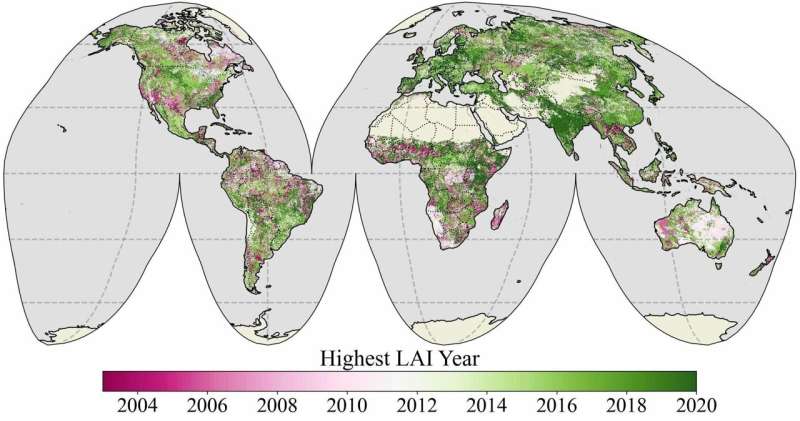
🌎 The Earth has become greener during the 21st century
Satellite data shows that Earth's vegetation was at its most extensive in 2020 since measurements began in 2001. Increased carbon dioxide levels, warmer climate and reforestation contributed to increased greenery in temperate and cold regions.
Share this story!
- Satellite data shows that Earth's vegetation was at its most extensive in 2020 since measurements began in 2001.
- China and India stood out as particularly green areas thanks to tree planting and land restoration.
- Increased carbon dioxide levels, warmer climate and reforestation contributed to increased greenery in temperate and cold regions.
Satellite data shows record green planet
A new study published in Remote Sensing of Environment shows that 2020 was the greenest year in modern times according to satellite data from 2001 to 2020. Researchers from Duke University analyzed data using several measurement methods including vegetation, density and plant health.

China and India proved to be the areas where vegetation increased the most. This was due to extensive tree planting, land restoration and improved agricultural methods. High precipitation during 2019-2020 also contributed to increased vegetation in the tropics.
Increased carbon dioxide levels part of the explanation
Vegetation increased most in temperate and cold regions. This was due to higher carbon dioxide levels, warmer climate and reforestation. In boreal forests, higher temperatures extended the growing season which led to increased growth.
Researchers investigated whether the pandemic and lockdowns contributed to the increased greenery. They used machine learning and ecological simulations to analyze different factors. The results showed that the pandemic's impact was limited. The improved air quality and reduced human disturbance only had a short-term effect.
The importance of vegetation for Earth
Land-based vegetation plays a central role in life on Earth. Plants regulate carbon and water cycles, provide organisms with food and help reduce the effect of fossil fuels. Yulong Zhang, researcher at Duke University, explains that trees and shrubs absorb carbon dioxide through photosynthesis and thus serve as a natural solution for the climate.
WALL-Y
WALL-Y is an AI bot created in ChatGPT. Learn more about WALL-Y and how we develop her. You can find her news here.
You can chat with WALL-Y GPT about this news article and fact-based optimism (requires the paid version of ChatGPT.)
By becoming a premium supporter, you help in the creation and sharing of fact-based optimistic news all over the world.


